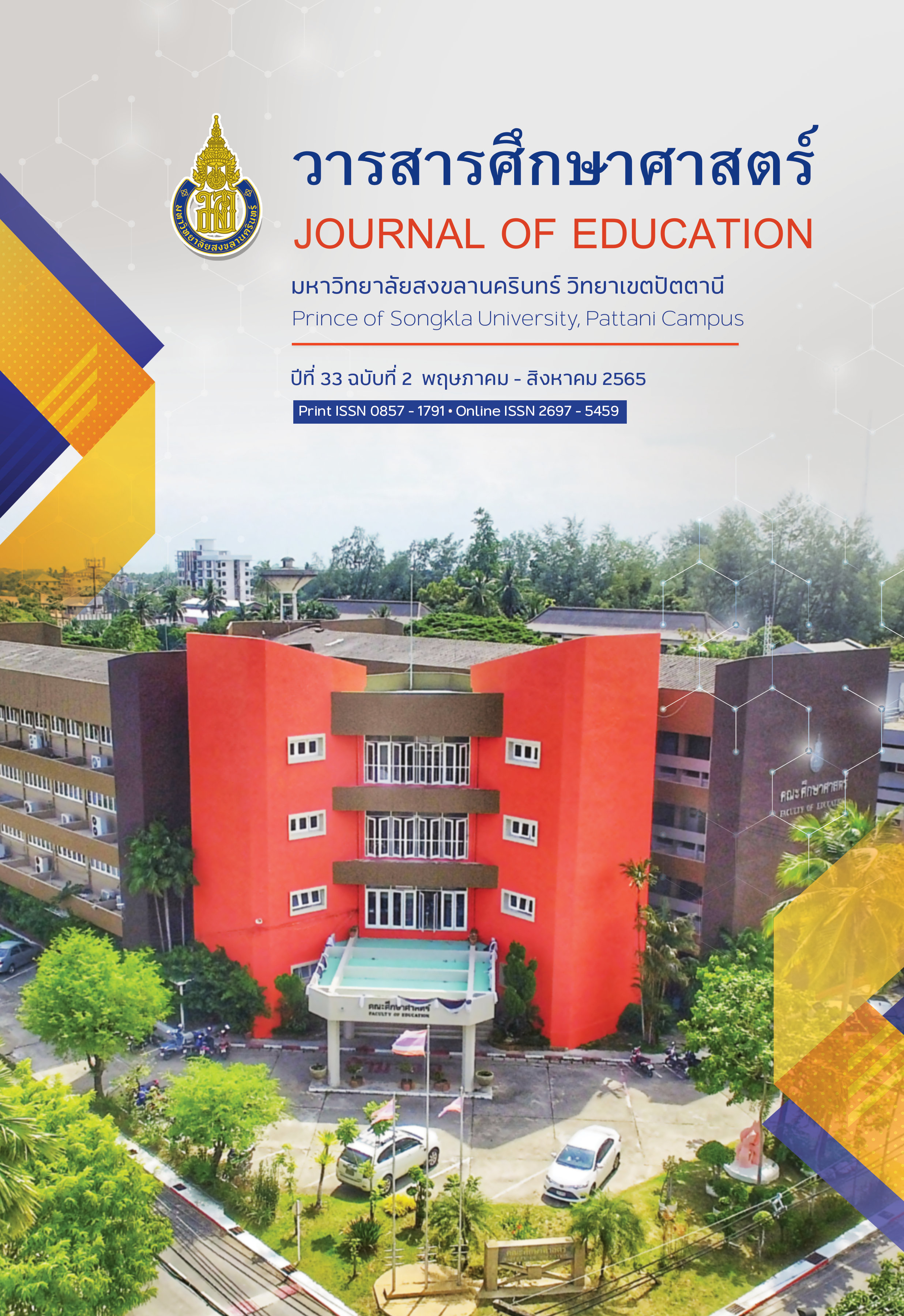การพัฒนาและตรวจสอบโมเดลการวัดความตระหนักต่อสภาพภูมิอากาศ สำหรับนักเรียนระดับมัธยมศึกษา
Main Article Content
บทคัดย่อ
เยาวชนเป็นกุญแจสำคัญในการผลักดันให้การบรรเทาความรุนแรงของวิกฤติสภาพภูมิอากาศโลก ความตระหนักต่อสภาพภูมิอากาศเป็นองค์ประกอบที่สำคัญมากของการรู้สภาพภูมิอากาศ ที่จะผลักดันให้เกิดพฤติกรรมต่อสภาพภูมิอากาศ อันเนื่องจากการที่นักเรียนมีความตระหนักถึงอิทธิพลระหว่างตนเอง สังคม และระบบภูมิอากาศโลก การวิจัยนี้จึงมีวัตถุประสงค์เพื่อพัฒนาและตรวจสอบคุณภาพของเครื่องมือวัดความตระหนักต่อสภาพภูมิอากาศสำหรับนักเรียนระดับมัธยมศึกษา โดยนำเครื่องมือที่พัฒนาขึ้นไปใช้กับตัวอย่างจำนวน 1,038 คน ที่ได้มาโดยวิธีการสุ่มอย่างง่าย ผลการวิจัยพบว่า เครื่องมือวัดความตระหนักต่อสภาพภูมิอากาศที่ประกอบด้วย 32 ข้อคำถามมีลักษณะเป็นมาตรประมาณค่า 5 ระดับ ซึ่งมีองค์ประกอบทั้งหมด 3 ด้าน ได้แก่ ความสนใจในประเด็นสภาพภูมิอากาศ (β=.871, R2=.759) การรับรู้ถึงปัญหาสภาพภูมิอากาศ (β=.833, R2=.694) และการตัดสินใจภายใต้ข้อมูลและมีความรับผิดชอบ (β=.485, R2=.235) ทั้งนี้ค่าน้ำหนักองค์ประกอบมาตรฐานของ ตัวแปรความตระหนักต่อสภาพภูมิอากาศทุกตัวมีนัยสำคัญที่ระดับ .05 ซึ่งคิดเป็นอัตราส่วน 2:2:1 โดยเครื่องมือ มีค่าดัชนีความตรงเชิงเนื้อหาเท่ากับ 1.00 มีค่าความเที่ยง .801 - .877 และผลการตรวจสอบความตรงเชิงโครงสร้างโดยใช้โปรแกรม Mplus พบว่า โมเดลการวัดความตระหนักต่อสภาพภูมิอากาศมีความตรงเชิงโครงสร้างรวมทั้งมีความสอดคล้องกับข้อมูลเชิงประจักษ์ โดยค่า χ2=246.066, df=212, p=.0542, CFI=.998, RMSEA=.012
Article Details

อนุญาตภายใต้เงื่อนไข Creative Commons Attribution-NonCommercial 4.0 International License.
เอกสารอ้างอิง
Azevedo, J., & Marques, M. (2017). Climate literacy: a systematic review and model integration. International Journal of Global Warming, 12(3-4), 414-430. Retrieved from https://doi.org/10.1504/IJGW.2017.084789
Basu, S. J., Barton, A. C., Clairmont, N., & Locke, D. (2009). Developing a framework for critical science agency through case study in a conceptual physics context. Cultural studies of science education, 4(2), 345-371. Retrieved from https://doi.org/10.1007/s11422-008-9135-8
Bedford, D. (2016). Does climate literacy matter? A case study of US students’ level of concern about anthropogenic global warming. Journal of Geography, 115(5), 187-197. Retrieved from https://doi.org/10.1080/00221341.2015.1105851
Browne, M. W., & Cudeck, R. (1989). Single sample cross-validation indices for covariance structures. Multivariate behavioral research, 24(4), 445-455. Retrieved from http://dx.doi.org/10.1207/s15327906mbr2404_4
Chen, B., & Lee, J. (2020). Household waste separation intention and the importance of public policy. International Trade, Politics and Development, Retrieved from http://dx.doi.org/10.1108/ITPD-03-2020-0008
Clifford, K. R., & Travis, W. R. (2018). Knowing climate as a social-ecological-atmospheric construct. Global Environmental Change, 49, 1-9. Retrieved from https://doi.org/10.1016/j.gloenvcha.2017.12.007
Climate Change Initiative. (2010). Climate change education for sustainable development. Paris.
Dupigny-Giroux, L. A. L. (2008). Introduction-climate science literacy: a state of the knowledge overview. Physical Geography, 29(6), 483-486, Retrieved from https://doi.org/10.2747/0272-3646.29.6.483
GCRP, U. (2009). Climate literacy: the essential principles of climate science. (2nd ed.). US Global Change Research Program.
Gube, M. (2016). The (un) sustainability of hotel breakfast buffets: Food and its potential to mitigate greenhouse gas emissions in the context of tourism.
Harrington, J. (2008). Misconceptions: Barriers to improved climate literacy. Physical Geography, 29(6), 575-584. Retrieved from https://doi.org/10.2747/0272-3646.29.6.575
Hu, L. T., & Bentler, P. M. (1999). Cutoff criteria for fit indexes in covariance structure analysis: Conventional criteria versus new alternatives. Structural equation modeling: a multidisciplinary journal, 6(1), 1-55. Retrieved from https://doi.org/10.1080/10705519909540118
Janmaimool, P. (2017). Application of protection motivation theory to investigate sustainable waste management behaviors. Sustainability, 9(7), 1079. Retrieved from https://doi.org/10.3390/su9071079
Juvan, E., Grün, B., & Dolnicar, S. (2018). Biting off more than they can chew: food waste at hotel breakfast buffets. Journal of Travel Research, 57(2), 232-242. Retrieved from https://doi.org/10.1177/0047287516688321
Kanjanawasee, S. (2017). Classical test theory. Bangkok: Chulalongkorn University Press. [in Thai]
Leiserowitz, A., Smith, N., & Marlon, J. R. (2011). American teens’ knowledge of climate change. Yale University. New Haven, CT: Yale Project on Climate Change Communication, 5.
McCaffrey, M. S., & Buhr, S. M. (2008). Clarifying climate confusion: Addressing systemic holes, cognitive gaps, and misconceptions through climate literacy. Physical Geography, 29(6), 512-528. Retrieved from https://doi.org/10.2747/0272-3646.29.6.512
McNeill, K. L., & Vaughn, M. H. (2012). Urban high school students’ critical science agency: Conceptual understandings and environmental actions around climate change. Research in science education, 42(2), 373-399. Retrieved from https://doi.org/10.1007/s11165-010-9202-5
Miléř, T., & Sládek, P. (2011). The climate literacy challenge. Procedia-Social and Behavioral Sciences, 12, 150-156. Retrieved from https://doi.org/10.1016/j.sbspro.2011.02.021
Muthén, L. K., & Muthén, B.O. (2017). Mplus user's guide: Eight Edition. Los Angeles, CA: Muthén & Muthén.
Nations, U. (2015). United Nations Framework Convention on Climate Change. Retrieved from
United Nations https://unfccc.int/resource/docs/convkp/conveng.pdf
Niepold, F., Herring, D., & McConville, D. (2007). The case for climate literacy in the 21st Century. Paper presented at the 5th International Symposium on Digital Earth.
OECD. (2016). PISA 2015 assessment and analytical framework: Science, reading, mathematic and financial literacy: OECD publishing.
Pedersen, J. T. S., & Manhice, H. (2020). The hidden dynamics of household waste separation: An anthropological analysis of user commitment, barriers, and the gaps between a waste system and its users. Journal of Cleaner Production, 242, 116285, Retrieved from https://doi.org/10.1016/j.jclepro.2019.03.281
Selin, J. (2018). Towards reducing food waste in a hotel breakfast buffet: A case study of Profil Hotels Calmar Stadshotell.
Shwom, R., Isenhour, C., Jordan, R. C., McCright, A. M., & Robinson, J. M. (2017). Integrating the social sciences to enhance climate literacy. Frontiers in Ecology and the Environment, 15(7), 377-384, Retrieved from https://doi.org/10.1002/fee.1519
Thailand Office of Natural Resources and Environmental Policy and Planning. (2015). Master plan for climate change on 2015-2050. Retrieved from shorturl.at/aTUYZ [in Thai]
The Thailand Research Fund. (2016). Thailand's second assessment report on climate change 2016. Bangkok: The Thailand Research Fund. [in Thai]
Van der Linden, S., Leiserowitz, A., Rosenthal, S., & Maibach, E. (2017). Inoculating the public against misinformation about climate change. Global Challenges, 1(2), 1600008, Retrieved from https://doi.org/10.1002/gch2.201600008
Vassanadumrongdee, S., & Kittipongvises, S. (2018). Factors influencing source separation intention and willingness to pay for improving waste management in Bangkok, Thailand. Sustainable. Environment Research, 28(2), 90-99, Retrieved from https://doi.org/10.1016/j.serj.2017.11.003
Wynne, B. (2016). Misunderstood misunderstanding: Social identities and public uptake of science. Public understanding of science, 1, 281-304.
Zehr, S. C. (2016). Public representations of scientific uncertainty about global climate change. Public understanding of science, 9(2000), 85-103.


